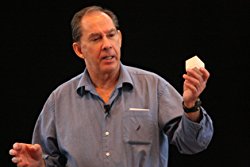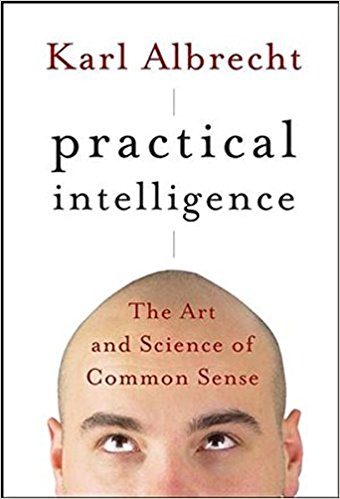Practical Intelligence Summary
5 min read ⌚
 The Art and Science of Common Sense
The Art and Science of Common Sense
Develop reasoning skills by using this book as an instruction manual
In this book summary, you’ll find the essential skills required to pull out any type of job.
Who Should Read “Practical Intelligence”? And Why?
In the hope of getting one step ahead, you mustn’t reveal your strengths. Such advice sounds a bit confusing, but if you conduct a quick observation, you’ll see that 99% percent of the time, people stick to their comfort zone.
Fortunately, practical knowledge is as efficient as any other like mental skill is not bonded to anything.
We give our thumbs up and prescribe “Practical Intelligence” to the wider audience because it manifests many aspects valuable to every person.
About Karl Albrecht
 Karl Albrecht was a German entrepreneur, speaker, writer, motivator, and management consultant. He was born in 1920 in Essen – Weimar Republic.
Karl Albrecht was a German entrepreneur, speaker, writer, motivator, and management consultant. He was born in 1920 in Essen – Weimar Republic.
Before his death in 2014, his estimated net-worth has reached an astonishing US$29 billion. His most important conquest was the creation of Aldi-supermarkets.
“Practical Intelligence Summary”
Intelligence and wisdom had always been subjected to various tests and measurements among the people. Furthermore, communities used to gather around, talking and investigating around subjects which bothered the average human mind.
Escaping from thoughts is a process that suffers the consequences of reduced rationality and increased sensitivity. Psychometricians approach “intelligence” with a dose of skepticism, while the mysterious general intelligence factor “g,”- even today remains a message in a bottle.
This enigma covers only essential aspects that makes the ordinary man feel well-satisfied. Those born with a quick mind reaction must find the perfect balance which will allow them to succeed using only their mind-capabilities.
Lucky are those whose intentions are associated with pure heart – has been said previously. Lots of examples, underline people’s abilities that don’t neglect the spiritual part of one’s self and in near future will surely gain momentum.
In spite of the habit to often interpret life from personhood, you might give it a try to broaden your horizons. You can start by simply identifying your goals, which are backed by a well-defined vision.
Nowadays, the society is bombarded with all sorts of self-help tips, but in order to take advantage of them and enjoy life fully, one must be prepared to risk in order to gain something in return.
The Harvard psychologist Howard Gardner, wondered – is it our mind designed to use its full capacity and why are we utilizing a single metric when it comes to evaluation? – As a result of this mystery, the concept of “multiple intelligences,” came to light.
The 1983 book – Frames of Mind: Theory of Multiple Intelligences, justifies the importance of utilizing all types of intelligence.
At the time, “thinkers” saw intelligence as a mind-game tool, not as a range of values.
People who can fill-in a Sunday New York Times crossword puzzle with the greatest of ease, in less than 15 minutes, play chess on a regular basis, and handling 7-digit math calculations without the use of a calculator – don’t speak for all levels of intelligence.
The author strongly endorses this theory and furthermore examines all aspects of mind-perception. In the same fashion, he offers various comparatively oriented ideas, which suffocate the notion of better.
To justify some of these concepts, a deep understanding of spaciousness must come naturally. Then again, don’t hold a job, whose routine endangers your creativity, make your brilliant ideas felt on the shoulders of others.
What’s the purpose here?
If we live under Karl Albrecht’s plans or rules, then IQ loses its firm ground and joins the relative phenomena.
Perhaps, the whole evolutionary process required a bit more on the “open” side, than on the actual intelligent side. Other than saying that people have particular six unique bits of intelligence, he also emphasized the values of each.
No stranger to the world of habit, Howard continued to explore numerous things. This hidden dust on a societal level is merely a reflection of what we have become.
Look at it this way – the author challenges you to think about a few close people, which according to your standards are intelligent. Your judgments that may be right or wrong, but the truth will always be a part of creativity and authenticity.
Knowing their “stupidity” is not a sign of a lack of brilliance but quite the opposite. In other words, distance yourself from “actors” and “rational movements” and co-join the “sinner-class”.
These days, the digital world is more open to new facts and information, like “Practical Intelligence”. Ask yourself what is more efficient, theory or practice? – You might know the answer already.
Perhaps from time to time, you’ll still have that sense of loss, but that’s just the beginning of moving slowly towards a more practical awareness.
Key Lessons from “Practical Intelligence”
1. The creation of an “Intelligent Category”
2. Intelligence metrics and effects
3. Don’t create division between Intuition and Logic
The creation of an “Intelligent Category”
In modern history, scientists like Einstein often linked happiness with intelligence, sometimes even with fantasy.
According to them, if a person lacks ingenuity, individually, and internal capacity, such an individual, is not worthy of being a part of the “intelligent database.”
Intelligence metrics and effects
There are other types of intelligence other than IQ. Nowadays, people stick to the unworthy judging metrics when it comes to intelligence.
However silly that may sound, this opinion widely spread among the people.
Don’t create division between Intuition and Logic
The problem-solving attitude can either be supported by a more intuitive nature, or logical mindset.
The real question – Do we have to choose? These two are not only mutually exclusive styles of thinking but also separated entities with a merging capacity.
Like this summary? We’d Like to invite you to download our free 12 min app, for more amazing summaries and audiobooks.
“Practical Intelligence” Quotes
Many so-called ‘personality conflicts’ are actually the result of significant differences in these mental preferences or thinking styles. Share on X In our saner moments, we realize that we tend to get better results in dealing with most people and most situations by approaching them in a positive, cooperative spirit rather than an antagonistic spirit. Share on X Creativity researchers report a close three-way relationship between sense of humor, particularly clever use of language; positive thinking; and the ability to think creatively and generate new ideas. Share on X Perhaps we can start thinking of ourselves not as ‘human beings’ but as ‘human becomings. Share on X Practical Intelligence: the mental ability to cope with the challenges and opportunities of life. Share on XOur Critical Review
No stranger to risk is no stranger to intelligence! This book comes as a blessing to those willing to adopt a more flexible approach.
Don’t be afraid the exploit the opportunities of today!
Emir is the Head of Marketing at 12min. In his spare time, he loves to meditate and play soccer.


 The Art and Science of Common Sense
The Art and Science of Common Sense




